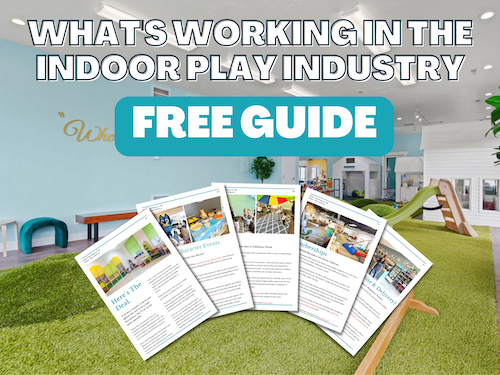Lead Better At Your Play Cafe Business With These 10 Important Habits

Managing your team is one of the hardest parts of owning a play café or indoor playground. It’s one of the most complex, time-consuming, and often most draining aspects of being an owner.
You might have started this business because you love creating beautiful spaces, connecting with families, or designing the perfect birthday parties. But before long, you find yourself trying to manage a crew of high school students, college kids, and maybe a few stay-at-home parents working during school hours—and it can feel like herding cats. Everyone has different schedules, priorities, and motivations, and keeping people aligned can feel impossible.
The truth is: our industry is different. It’s not like managing a 9-to-5 office team. Our staff is mostly part-time, often young or inexperienced, and sometimes working their very first job. Their motivation isn’t always money—sometimes it’s flexibility, fun, or a sense of belonging.
So the usual corporate advice about “leadership” doesn’t really apply to us.
Here are 10 leadership habits that will make your employees respect and follow you—not because they have to, but because they want to.
1. Model the Behavior You Expect
If you expect your team to clean the ball pit thoroughly, they need to see you doing it once in a while—not every day, but often enough that they know you’re not “above” the work.
When you roll up your sleeves, grab a rag, and start wiping down tables or mopping the café floor alongside your teenage team member, you’re silently communicating, “We all do what it takes here—no exceptions.”
This isn’t about micromanaging or proving how hard you work. It’s about setting the cultural tone. When your staff sees you handling the less glamorous parts of the job—wiping down high chairs, refilling napkin dispensers, sanitizing toys—they’ll mirror that attitude.
Once, during a hectic Saturday, I helped a new hire clean up between parties. She looked shocked and said, “Wait… you do this too?” That moment completely shifted how she showed up. From then on, she jumped in wherever she saw a need. Respect doesn’t come from barking orders; it comes from demonstrating that no task is beneath you—and that every role matters.
2. Communicate Openly and Early
In a busy play café, communication isn’t just important—it’s survival.
Between birthday parties, classes, and a steady stream of caffeine orders, tiny missteps can spiral fast. If the closing shift forgets to restock coffee beans, the morning barista starts frustrated. If a host doesn’t tell the next shift the balloon pump broke, the next setup is delayed.
As an owner, one of the best habits you can build is addressing small issues the moment you notice them. Don’t wait until the end of the week or a quarterly review—handle it right then.
If someone’s late repeatedly or skipping checklist items, have a calm, private conversation that same day. Approach it with curiosity, not criticism:
“Hey, I’ve noticed you’ve been clocking in a few minutes late this week—is everything okay?”
That one question might uncover a simple issue you can solve together. When you address things early, you show that feedback isn’t punishment—it’s support.
Waiting too long creates anxiety and resentment. Consistent, direct communication builds trust and keeps everything running smoothly when the next rush hits.
3. Listen Like You Mean It
Listening is one of the most underrated leadership skills—and one of the easiest ways to earn lasting respect.
Your teenage team member might be terrified to “talk back.” Your stay-at-home parent employee might hesitate to ask for a schedule change. Those small, unspoken things often lead to bigger problems later.
When someone brings up an idea or frustration, stop what you’re doing, make eye contact, and listen. Ask follow-up questions.
A part-time high-schooler once suggested color-coding our toy bins by age group to make cleanup faster. It was such a simple idea, but it made a huge difference. Because I took her seriously and implemented it, she started showing up with more confidence and ownership.
When employees feel heard—and see their ideas put into action—they stop thinking like hourly workers and start thinking like owners. That kind of buy-in is priceless.
4. Take Responsibility—Even When You Could Blame Someone Else
Things will go wrong. A parent will complain, a staffer will forget to restock something, or a spill will happen mid-rush.
When that happens, take ownership publicly and coach privately.
If a customer says, “No one cleaned the tables after open play,” respond with,
“I’m so sorry about that—that’s on me. Let me fix it right now.”
That small phrase shows your team what accountability looks like. Later, you can debrief privately and prevent it from happening again.
Owners who throw employees under the bus create fear. No one takes initiative when they expect blame. Protect your team, even when they mess up.
Even online—if a Google review calls out a specific employee, resist the urge to pile on or promise to “address it.” That review reflects your leadership, training, and systems. Protecting your team at all costs builds far more trust than agreeing with an angry customer.
5. Empower Instead of Micromanage
Because so many employees in this industry are young or part-time, it’s easy to fall into the trap of doing everything yourself. But micromanagement crushes initiative.
Empower your team with small ownership opportunities:
-
Let your most reliable weekend host plan a themed event.
-
Let your café lead develop a seasonal drink.
-
Let your manager-in-training run a staff meeting or revise a checklist.
Yes, they’ll make mistakes. But every mistake under your supervision is an investment in their growth—and in your freedom.
Once, an employee forgot to order balloons for a party. Instead of taking over permanently, I helped her set a reminder system. She fixed it herself and never forgot again. Empowerment builds accountability. Micromanagement builds dependence.
6. Recognize Every Win—Big or Small
In a business with high turnover and part-time staff, recognition isn’t optional—it’s oxygen.
A sincere compliment can mean more than a raise to a teenager at their first job. Be specific with your praise:
Instead of “Good job,” say, “I saw how calmly you handled that spill during the rush—that made a huge difference.”
Create systems for peer recognition too. My team loved our “caught in the act” jar. Staff wrote down when they saw a teammate doing something great, and we read them aloud weekly with a small prize.
If most of your team works solo, ask customers to mention team members by name in reviews. Add a sign or QR code that says, “Had a great experience today? Tell us who helped you—we reward great service!” Then actually do it.
Recognition builds engagement, retention, and culture—all essential in people-driven businesses like ours.
7. Stay Calm in Chaos
Chaos is part of our world: toddlers crying, espresso machines breaking, overlapping parties, and customers needing help all at once. Your energy sets the tone for everyone else.
If you’re frantic, your team will panic. If you stay calm and confident, they’ll follow your lead.
I’ve had mornings where everything went wrong at once. I smiled and said, “Alright—here’s what we’re going to do.” Inside, I was stressed, but staying composed helped everyone else stay steady too.
The same applies to emotional moments with staff. When an employee comes to you upset or defensive, lower your tone instead of matching theirs. Calm is contagious. It creates safety and helps your team focus on solutions instead of spiraling.
8. Be Fair and Consistent
Few things erode trust faster than perceived favoritism.
It’s natural to have favorite employees—but make sure everyone knows exactly how to become one. At my café, my “favorites” were the people who showed up on time, communicated well, and took initiative. Everyone knew that, and it made the system feel fair.
If you grant flexibility or rewards, explain why. For example,
“We make schedule accommodations when someone gives plenty of notice.”
Fairness doesn’t mean treating everyone identically—it means enforcing expectations evenly.
Consistency in both accountability and praise builds trust. Your team should never have to guess where they stand. When the rules stay the same regardless of who’s working or who’s watching, you create a culture of safety and respect.
9. Invest in Their Growth—Even If They Won’t Stay Forever
Not every team member will stay forever—and that’s okay.
Many employees are students, parents, or between seasons of life. You’re a chapter in their story, not the whole book. But investing in their growth while they’re with you builds both loyalty and capability.
If a café attendant is interested in marketing, give her a few hours to manage Instagram or reply to DMs. Buy her a mini-course. Teach her how you plan your Reels.
If a shift lead shows management potential, bring her to an industry event or workshop. Exposure to other leaders can completely change how she shows up at work.
Every hour you spend developing someone builds your own freedom. Some employees will leave—and when they do, celebrate them. Write recommendations, stay connected, and be proud they started with you.
When your team sees you investing in everyone’s growth, they’ll work harder, stay longer, and trust you more.
10. Lead with Humility
Humility earns instant respect.
It doesn’t mean downplaying your expertise or letting your team walk all over you. It means admitting when you don’t know something and asking for help.
We juggle food service, safety, events, and staff management daily—no one has it all figured out. Your team already knows that. Pretending otherwise only creates distance.
When our party bookings dropped unexpectedly, I admitted to my staff, “I don’t know what’s going on here—what do you think?” A quiet 17-year-old suggested our online calendar was confusing. She was right. Fixing that solved the problem instantly.
Ask your team questions like:
-
“What would make your shift easier?”
-
“What do guests complain about most, and how could we fix it?”
-
“If you owned this business, what’s one thing you’d change?”
Give credit publicly when you use their ideas: “This new sign layout was Jenna’s idea—great catch!”
Humility shows that leadership is about curiosity, not ego. When you model openness, your team mirrors it. They ask questions, accept feedback, and collaborate more. That’s how you build an unstoppable culture.
Being a respected leader in your indoor playground or play café isn’t about perfection or control. It’s about consistency, clarity, and care.
When you model the behavior you expect, communicate openly, listen deeply, take responsibility, empower your team, and lead with humility, you create something far more powerful than a business—you create a culture.
And in our industry, culture is everything.
It’s what keeps part-timers showing up with energy, what makes families feel cared for, and what allows you to finally step back and trust that your space—and your team—can thrive even when you’re not there.
The best teams don’t happen by accident. They’re built intentionally, by leaders who choose to grow—for their people, their business, and their own peace of mind.



